Fleurs du Mal Magazine


Or see the index
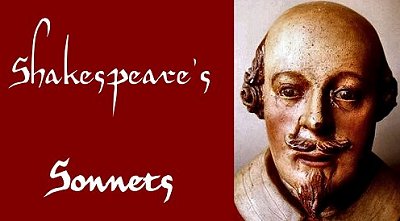
William Shakespeare
(1564-1616)
THE SONNETS
Sonnet 146
Poor soul the centre of my sinful earth,
My sinful earth these rebel powers array,
Why dost thou pine within and suffer dearth
Painting thy outward walls so costly gay?
Why so large cost having so short a lease,
Dost thou upon thy fading mansion spend?
Shall worms inheritors of this excess
Eat up thy charge? is this thy body’s end?
Then soul live thou upon thy servant’s loss,
And let that pine to aggravate thy store;
Buy terms divine in selling hours of dross;
Within be fed, without be rich no more,
So shall thou feed on death, that feeds on men,
And death once dead, there’s no more dying then.
![]()
kempis.nl poetry magazine
More in: -Shakespeare Sonnets

Facebook vriendenverzoek van ene Geert
Misschien wil je wel vrienden worden. Ik ben Geert, ben 50 jaar en in de vut. Ik doe tuinieren en konijnen jagen en heb twee kleinkinderen joost en joost. Verder hou ik van vakanties maar liever wel in Nederland en als het kan niet verder dan 20 km van mijn geboorteplaats waar ik nog altijd woon: Drunen. Ik ga dan naar naturistencamping “de klepel gevonden” en doe dan cursussen in koemelk pasteurisatie… Lekker met mijn handen bezig.. hou ik van. Ik werkte ooit wel, toen deed ik administratie bij een bedrijf dat zich specialiseert in administratie van het administreren. Wel boeiend maar ik deed het toch niet met Èchte passie. Ik wilde altijd met mijn handen bezig zijn en hou al mijn hele leven van de natuur. En dan vooral van koeien. Koeien zijn zulke machtige beesten, ze sluipen s’nachts mijn tuintje in en eten dan mijn peentjes op. Zij eten ze op en toch plant ik ze elk jaar weer. Op een dag kon ik zo dichtbij komen dat ik een koe (ik heb haar Tuffeltje genoemd) kon aanraken. Tuffeltje leek het prettig te vinden en ik aaide haar over haar prachtige glanzende rug. Ze keek mij aan en haar grote diepe ogen staarden in de diepte van mijn ogen. Ik aaide haar verder en ze begon te kauwen, te kauwen van plezier. Ik ging verder omlaag met mijn handen en raakte haar prachtige, grote uiers aan, ze stonden op spanning en de huid leek als gelooid leer, zo glad. Ik begon haar te melken en ze bleef kauwen. Ik zette mijn lippen aan Tuffeltje’s tepel en dronk haar melk zo puur uit haar. Maar zo teder als het moment was, zo stroef was de smaak van haar melk. Dat moment heeft mij geïnspireerd tot de verdieping in de pasteurisatie kant van de melk-business. Machtig mooi. Ik hoop ooit op een dag de melk zo gepasteuriseerd te krijgen dat ik het zo vers en nog warm maar toch gezuiverd uit de tepel van Tuffeltje kan drinken. Maar voorlopig moet ik het nog houden bij de lessen die ik in de zomer kan hebben, ik heb het niet breed en probeer wat bij te klussen via het doorverkopen van konijnenbontjes en oude puzzels. Nou ja, ik zag je dus op facebook en ik vond je foto heel speciaal. Ook je posts vond ik leuk, deden mij denken aan de dromen die ik ooit had.. Dromen, ja, ik maak mijn dromen nu wel waar. Maar jouw ideeÎn vond ik zuiver en deden mij denken aan de melk van mijn koe. Misschien wil je vrienden worden, ik zou je graag laten zien hoe je goeie melk maakt. Dan leer ik je hoe je goed moet melken en dan laat ik je, misschien, ook wel Tuffeltje melken. Ze is heel speciaal en zal je een leuk meisje vinden. Nou. Dit was dan mijn gedoe, ik doe mijn best. Groet. Geert.
Esther Porcelijn
Eerder gepubliceerd in de serie Stadsjutten van het Brabants Dagblad
fleursdumal.nl magazine
More in: Archive O-P, Porcelijn, Esther
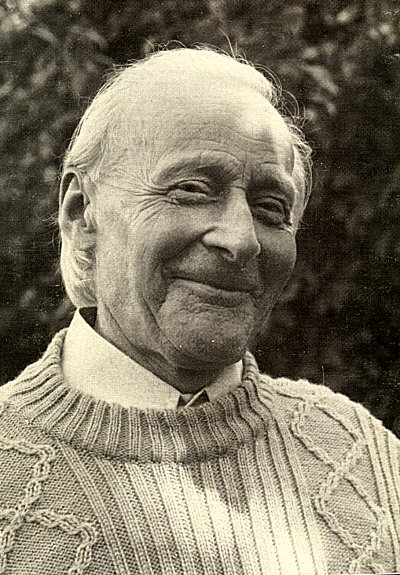
Joop Oversteegen
(Amsterdam 1900 – Eindhoven 1994)
‘Ome Joop’ werd Oversteegen genoemd door veel dichters. Hij stond altijd voor hen en kunstenaars in het algemeen klaar. Toen hij in 1962 het initiatief namen tot de Schrijvers Associatie Opwenteling ging dat ten koste van zijn eigen spaargeld.
Oversteegen nam het initiatief omdat de Brabantse dichters landelijk nauwelijks tegen het ‘poëtisch geweld’ van de dichters en schrijvers uit de randstad op konden. Met name jonge dichters hadden hier geen schijn van kans. En poëzie was juist van belang voor de ontwikkeling van de vrij denkende mens! Stad en land werd door hem afgelopen om contacten te leggen. De resultaten waren er naar. Uiteindelijk zouden heel wat later bekend geworden dichters en schrijvers bij de Eindhovense Schrijvers Associatie Opwenteling debuteren. Denk bijvoorbeeld aan Frans Kuijpers, Maria van der Steen, Hans Vlek, Silva Ley en Hans van de Waarsenburg. Maar ook de voor de tijd van Opwenteling landelijk bekend staande dichter Frans Babylon werd bij Opwenteling gepubliceerd. In totaal zagen zeker zo’n zeshonderd dichters bij Opwenteling hun poëzie in bundelvorm verschijnen. Allemaal gerealiseerd door vrijwilligers of die in de redacties functioneerden, bij de PR of er voor zorgden dat het secretariaat functioneerden.
De Schrijvers Associatie Opwenteling had een ideaal en groeide uit tot een landelijke en in België bekende debuutuitgeverij van bloemlezingen en persoonlijke dichtbundels. En dat niet alleen, hoorspelen, korte verhalen kregen eveneens hun plaats. In de loop der tijd kende ‘Opwenteling’ verschillende voorzitters. Allereerst Oversteegen zelf, die naast de dichtbundels eveneens het literair tijdschrift ‘Manifest’ publiceerde, Ton Veugen die de bekende reeks ‘Naar Morgen’ het licht deed zien. Riet van Gent die de fakkel van hem overnam. Wim van Til, de huidige directeur van het Studie en Documentatiecentrum ‘Poëzie Centrum Nederland’ in Bredevoort en schrijver van diverse dichtbundels zowel bij en buiten Opwenteling. Will van Sebille die na haar voorzitterschap bij Opwenteling actief was als begeleidster van jonge dichters wat leidde tot de bundel ‘Re_cyclus’, de schrijfgroep ‘Het schrijfsterscollectie Eindhoven’ en een dichtersgroep uit Delft. Zelf bleef ze bezig als dichter, publiceerde een dichtbundel en leverde bijdragen aan verschillende bloemlezingen. Als uitgever bij De Witte Uitgeverij (tussen 2007 en 20012) zette zij de reeks ‘Witte Voeten’ op, waarin ook weer een aantal opwenteling dichters verschijnen.
Latere voorzitters zijn Bernard Kessels en Willem Fonteijn. De dichtbundel ‘’ Dat ik je dan vastleg’ van de Eindhovenaar Chris van Lenteren en Jan Holman onder de redactie van Jack Tinnemans is de laatste uitgegeven bundel van de Stichting Schrijvers Associatie Opwenteling.
Onlangs maakte Opwenteling een doorstart. Hoewel niet op dezelfde leest geschoeid als zijn illustere voorganger. Daarover meer tijdens het literair Podium ‘Joop Oversteegen en Opwenteling op 28 oktober a.s.
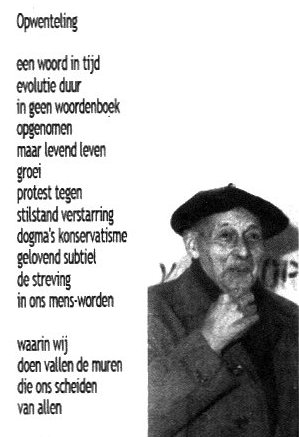
De Werkgroep ‘Boekenkast’ III. Organiseerde eerder een soortgelijk podium over Frans Babylon en Lodewijk van Woensel (Louis Vrijdag). Doel: Het onder de aandacht brengen van overleden dichters die in de ontwikkeling van de poëzie in Eindhoven en regio van belang zijn geweest. De werkgroep bestaat uit: Willem Adelaar (dichter), Pierre Maréchal (schrijver/dichter) en Peter Thoben (Cultuur- en kunsthistoricus).
De Popband Beez. Over de bekende verrassende Eindhovense Band Beez valt veel te schrijven. Tijdens het vorige literaire programma van De Werkgroep Boekenkast brachten zij indrukwekkende muziek aan de hand van gedichten van Lodewijk van Woensel (Louis Vrijdag). Deze keer brengen zij muziek en zang ten gehoor aan de hand van gedichten van Joop Oversteegen. Nadere informatie: www. beezbeez.nl
De bekende blues zanger en gitarist Ernest van Aaken ontvangt met zijn muziek de gasten van deze middag. Van Aaken is onder andere bekend van zijn deelname aan K& B Literair, NulVeertig©, Poëtement en momenteel ‘Eindhoven uit de kunst’.
Groendomein Wasven. Bestaat uit: Gasterij in ’t Ven, Tussen de Molens en De Wasvenboerderij met een groene omgeving waarin het niet alleen goed vertoeven is maar waar mens, natuur en milieu belangrijk zijn. In dit kader worden er educatie-avonden gehouden. Om kennis te maken met het groendomein is het raadzaam om vroeger te komen en eens door het gebied te wandelen. De Wasvenboerderij is geopend van 10 – tot 22. Uur. Gasterij open van Nadere informatie: www.wasven.nl
Literair Podium over Joop Oversteegen en Opwenteling
Waar: Groendomein Wasven, Celebeslaan 30, 5641 AG Eindhoven (stadsdeel Tongelre).
Wanneer: Zondag 28 oktober 2012
Tijd: 14.00 uur- 17.00 uur
Parkeren in de omliggende omgeving nabij bij ’t Hofke bijvoorbeeld
Openbaar vervoer: Bushalte ‘Hofke nabij het oude raadhuis van Tongelre. Bus 55 vanaf Eindhoven Station naar ’t Hofke. Let op de zondagtijden!
fleursdumal.nl magazine
More in: Archive O-P, Babylon, Frans, Brabantia Nostra, Waarsenburg, Hans van de

Doelman in vlucht
De oude doelman zucht boven zijn bier.
In dit café komt hij vanaf zijn jongenstijd.
Ook ploeggenoten zaten ooit zo dikwijls hier,
lokaal zich lavend aan vermaardheid.
Langs deze wanden ruisen de verhalen
nog van die haast eeuwenoude bal
nu die hij weghield van de houten palen,
het was nochtans een ongelofelijke knal.
Nog weet hij het, na zoveel jaren:
in glazen klanken galmde het publiek.
Regenen mocht die dag maar even.
Hij voelt de wind weer door zijn haren
glijden, hoort na die zege de muziek.
Voor altijd blijft hij zweven, zweven, zweven
Verschenen in Onaangepaste tijden, Zinderend, Bergen op Zoom, 2006
Bert Bevers poetry
kempis.nl poetry magazine
More in: Archive A-B, Bevers, Bert
![]()
In Memoriam Sylvia Kristel
(28 september 1952 – 17 oktober 2012)
Sylvia Kristel (Utrecht, 28 september 1952 – Amsterdam, 17 oktober 2012)
Actrice Sylvia Kristel is woensdagavond op 60-jarige leeftijd overleden aan de gevolgen van keelkanker. De actrice werd in juni 2012 ook al getroffen door een herseninfarct. De actrice had o.a. een relatie met de schrijver Hugo Claus, van wie ze in 1975 een zoon kreeg.
Sylvia Kristel werd in 1974 beroemd door de titelrol in de erotische film Emmanuelle. Daarna maakte ze nog acht Emmanuelle-films. Kristel genoot ook in het buitenland grote bekendheid. Ze maakte naast de Emmanuellefilms, ook nog films met bekende regisseurs als Claude Chabrol en Roger Vadim.
Kristel speelde ook in Nederlandse films: o.a. Pastorale 1943 van Wim Verstappen (1978) en Lijmen/Het been (2000) en in verschillende internationale films, zoals The nude bomb (1980), Lady Chatterley’s Lover (1981), Mata Hari (1985) en Dracula’s Widow (1988).
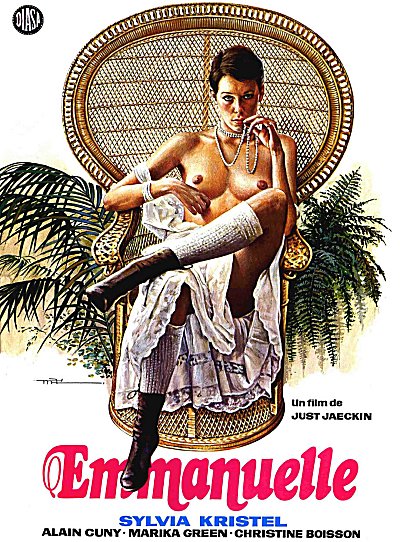
De actrice was ook een verdienstelijk schilder. Haar autobiografie Naakt (Nue) verscheen in september 2006 in Frankrijk en in februari 2007 in Nederland. Regisseur Michiel van Erp volgde Sylvia Kristel in 2006 voor het TV-programma Het uur van de wolf.
Sylvia Kristel wordt in besloten kring begraven.

fleursdumal.nl magazine
More in: Archive K-L, In Memoriam
![]()
In Memoriam Gerard Brands
(Gerard Bron)
22 november 1934 – 12 oktober 2012
Gerard Brands was samen met J. Bernlef en K. Schippers een van de oprichters van het literaire tijdschrift Barbarber.
Van Gerard Brands zijn diverse kinderboeken verschenen. Brands was verder o.a. medewerker van Hollands Diep en hoofdredacteur van het populair-wetenschappelijke tijdschrift Kijk.
Werken van Gerard Brands zijn o.a.
Padden verhuizen niet graag. Avonturen met dieren (1978)
Een krekel voor de keizer (1980)
Het schaap in de luie stoel (1980)
Meneer Beck gaat even een krant kopen (1983)
Charlotte, de kleinste vrouw van de wereld (1986)
Bolletje (1988)
Allemaal bedrog (1992)
Sara en Lijsje: twee honden en ik (1999)
De groentekoppen (2000)
De sprinkhanentemmer (2001)
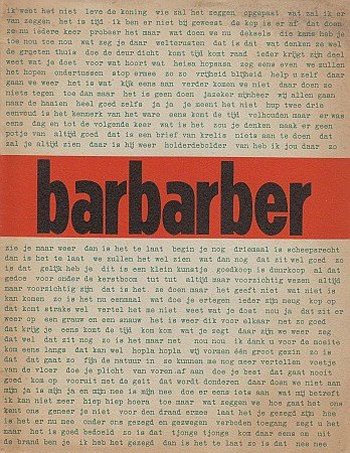
fleursdumal.nl magazine
More in: Archive A-B, In Memoriam
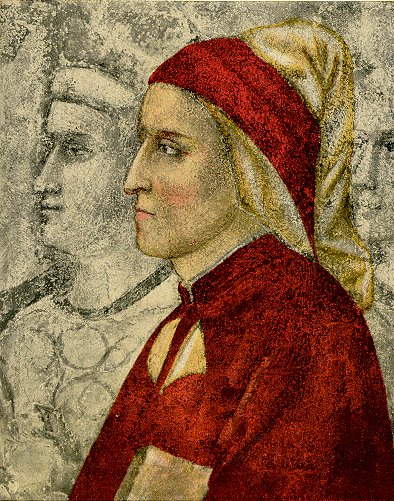
Dante Alighieri
(1265-1321)
Death, always cruel
Eath, always cruel, Pity’s foe in chief,
Mother who brought forth grief,
Merciless judgment and without appeal!
Since thou alone hast made my heart to feel
This sadness and unweal,
My tongue upbraideth thee without relief.
And now (for I must rid thy name of ruth)
Behoves me speak the truth
Touching thy cruelty and wickedness:
Not that they be not known; but ne’ertheless
I would give hate more stress
With them that feed on love in very sooth.
Out of this world thou hast driven courtesy,
And virtue, dearly prized in womanhood;
And out of youth’s gay mood
The lovely lightness is quite gone through thee.
Whom now I mourn, no man shall learn from me
Save by the measure of these praises given.
Whoso deserves not Heaven
May never hope to have her company.
“Death, always cruel” was translated into English by D.G. Rossetti (1828-1882)
Dante Alighieri poetry
kempis.nl poetry magazine
More in: Archive C-D, Dante Alighieri, Rossetti, Dante Gabriel

Norbert de Vries
Kemp natuurlijk (VI)
Vrouwen, de dood, kleuren, geuren, muziek, de zon. Allemaal belangrijke thema’s in het werk van Kemp.
“Ik weet het, de vrouwen mogen mij wel.” Zo luidt de eerste regel van zijn gedicht Sympathieën (uit 1940). En, van zijn kant, Kemp mocht de vrouwen graag. En sommigen werden zijn muzen
Zo was er de Muze Mya.
Maria Brennenraedts (1920-2000) was in 1947 als journaliste verbonden aan de Gazet van Limburg en verzorgde de ‘vrouwenpagina’. Naar aanleiding van haar artikel ‘Kousenromantiek en -werkelijkheid’ schreef Kemp op 30 juli 1947 naar de krant en verzocht om nadere informatie: “Als dichter interesseer ik mij bijzonder voor elken vorm van gedichten, ook die van commercieelen aard. Daarom zoudt u mij zeer verplichten, indien ik van U iets naders mocht vernemen omtrent de gedichten (en bij voorkeur den oorspronkelijken tekst) die Pilade Francheschi of Francetchi schrijft en inpakt bij de paren door hem bij een bezoek aan zijn museum verkocht.”
Kousen, vrouwenbenen, gedichten, ze vormden voor Kemp een onweerstaanbare combinatie.
Enfin, er ontstond spoedig een levendige correspondentie tussen Kemp en Brennenraedts. Als je de brieven van Kemp leest, word je spoedig een zekere erotische spanning of lading gewaar. Reeds op 26 september 1947, in het prille begin van de briefwisseling derhalve, reageert Kemp met enige bravoure op een opmerking van Mya dat iets “helemaal niet (is) zooals je van ‘een dichter’ verwachten zou”: “Maar ik kan U uit ervaring verzekeren, dat U zich bij een dichter meestal op het ergste kunt voorbereiden, want het zijn rare artiesten. En ik zou U niet gaarne sommige passages uit mijn gedicht ‘Pacific’, dat op het einde van 1946 verscheen, voorleggen, waar met de noodige reserves voor spot en tendresse l’eterno feminino op een soms niet altijd even elegante wijze wordt ‘bezongen’.”
(De brief was eerst, met potlood, in het klad geschreven; in dit klad drukt Kemp zich wat pregnanter uit; hij gebruikt daar de woorden ‘zeer ongezouten dingen’.)
In een brief van 28 april 1948 staat een in dit verband belangrijke passage. Kemp stelt daarin vast dat vrouwen en mannen elkaar soms ‘vanuit een subconscienten ondergrond’ toegenegen (het door Kemp geschreven woord kon ik niet ontcijferen) zijn. “Bij de eene begint het met een blik, bij een ander met een zinswending in woord of geschrift of hoe ook, maar er is een eigenaardige wederkeerigen drang om elkaar op een aangename, badineerende wijze zoo stilletjes een beetje dwars te zitten of te prikkelen.”
Inderdaad, de brieven zijn nu en dan prikkelend. Een voorbeeld? Neem de brief die Kemp op 5 januari 1956 aan Mya zendt, en die als volgt begint:
“Hallo, die Amazone!
De getiktheid van Uw brief heb ik maar aanvaard, al blijf ik het handwerk achten boven alles. Ik hoop, dat mijn inspiratrice nog niet bezweken is van haar drukte. U moet zich wel als een vrouwelijke Centaur voelen met Uw paard en U weet misschien niet meer waar het lichaam van Uw lievelingsdier overgaat in het Uwe. Gelukkig is Uw beider contact niet dat van sommige speelgoedruiters met speelgoedpaardjes, nl. een pinnetje op het zadel van het paard en een gaatje in de rijbroek van de berijder.”
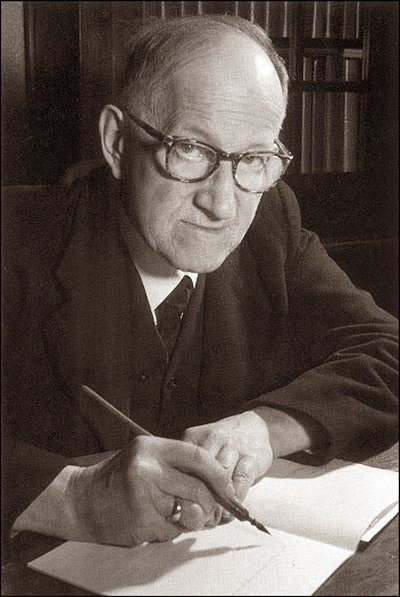
Zo zijn er tal van passages in de brieven van Kemp waarin hij, ietwat verbloemd of vrijmoedig, over seksualiteit schrijft. Soms werpt dat een nieuw licht op zijn gedichten. Neem het gedicht ‘Rouw’ (uit 1945). De slotregel luidt: ‘Een kind ruikt immers altijd naar aluin.’ Kemp noteert dat hij hierbij gedacht zal hebben aan iets wat hij las in ‘Het voortplantingsleven van den mensch’ van dr. H.J. Schim van de Loeff, namelijk, dat het zaad van de man naar aluin ruikt.
Tot slot van deze aflevering citeer ik een langer stuk uit de bovengenoemde brief van 5 januari 1956, waarin Kemp zijn oordeel weergeeft over de onderlinge verhouding der geslachten.
“Mannen zijn niet raarder dan vrouwen en O.L. Heer heeft ze ter wille van de voortplanting, waarvoor Hij verder geen tijd meer had, gemaakt zoals ze zijn. Een dokter zal U ook niet ‘het paard’ verbieden, want de grondslag der schepping, de daad die mannen en vrouwen voortzet, is een hippische. Aan het bezitten van de vrouw door de man is niets slechts. De man eet, vormt zich zaad en dat moet er op gezonde tijden uit, bij de volwassen man in de bloei van zijn leven volgens de geleerden tweemaal per week tweemaal achter elkaar. Ik heb een encyclopedie over de sexuele wetenschap, waaraan ook door een dominee uit Meerssen heeft meegewerkt en daar staat dat in. Inderdaad, mag men de ongehuwde moeder niet achter de andere, de gehuwde dus, stellen. Maar Uw dieren, uw hondjes, poesjes en paarden zijn evenmin ‘onschuldig’ als die op de vrouwen uitzijnde mannen. De mannen en vrouwen moesten wat minder jaloers zijn, maar de vogels zijn dat ook weer. Een paar weken geleden las ik van Lawrence, de schrijver van Lady Chatterley’s Lover, een boek getiteld Sex, Pornography and Censorship. Daar staan toch behartenswaardige dingen in. Ik raad het U aan eens te lezen, als dit nog niet geschiedde. Het is van 1955.
Dus van heden af aan beter denken s.v.pl. over de mannen, zij zijn aan de vrouwen gewaagd en omgekeerd. En wanneer er bij het paardrijden een man te pas moet komen en hij blijken van aanbidding geeft, is dat nu zo erg? Als hij maar even sterk naar een man ruikt als naar een paard, dan is er toch een harmonie voor de vrouwenneus, die men zich niet behoeft te ontzeggen. De pret van de man, die zijn zin wordt gegeven, is ook niet altijd honderd percent, maar kom, dit alles is een netelig chapiter, waarmee ik niet wil zeggen, dat ik het ontwijk.”
Norbert de Vries: Kemp natuurlijk (VI)
Mijmeringen over Pierre Kemp uit mijn Maastrichtse tijd
fleursdumal.nl magazine
More in: Kemp, Pierre, Norbert de Vries
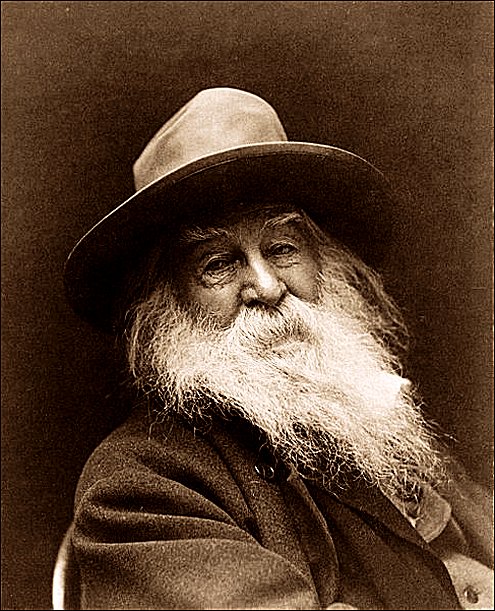
Walt Whitman
(1819–1892)
A Song
Come, I will make the continent indissoluble;
I will make the most splendid race the sun ever yet shone upon;
I will make divine magnetic lands,
With the love of comrades,
With the life-long love of comrades.
I will plant companionship thick as trees along all the rivers of
America, and along the shores of the great lakes, and all over
the prairies;
I will make inseparable cities, with their arms about each other’s
necks;
By the love of comrades,
By the manly love of comrades.
For you these, from me, O Democracy, to serve you, ma femme! 10
For you! for you, I am trilling these songs,
In the love of comrades,
In the high-towering love of comrades.
Walt Whitman poetry
kempis.nl poetry magazine
More in: Archive W-X, Whitman, Walt
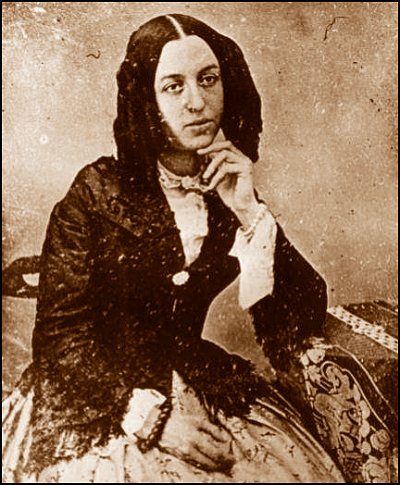
George Sand
(1804-1876)
Lettre envoyée par Aurore Dupin
dite George SAND
à Alfred de MUSSET
Je suis très émue de vous dire que j’ai
bien compris l’autre soir que vous aviez
toujours une envie folle de me faire
danser. Je garde le souvenir de votre
baiser et je voudrais bien que ce soit
là une preuve que je puisse être aimée
par vous. Je suis prête à vous montrer mon
affection toute désintéressée et sans cal-
cul, et si vous voulez me voir aussi
vous dévoiler sans artifice mon âme
toute nue, venez me faire une visite.
Nous causerons en amis, franchement.
Je vous prouverai que je suis la femme
sincère, capable de vous offrir l’affection
la plus profonde comme la plus étroite
amitié, en un mot la meilleure preuve
que vous puissiez rêver, puisque votre
âme est libre. Pensez que la solitude où j’ha-
bite est bien longue, bien dure et souvent
difficile. Ainsi en y songeant j’ai l’âme
grosse. Accourez donc vite et venez me la
faire oublier par l’amour où je veux me
mettre
George Sand (1835)
NB : A vous de découvrir l’érotisme caché.
Relisez-la en sautant les lignes paires

La réponse d’Alfred de Musset
Quand je mets à vos pieds un éternel hommage,
Voulez-vous qu’un instant je change de visage ?
Vous avez capturé les sentiments d’un coeur
Que pour vous adorer forma le créateur.
Je vous chéris, amour, et ma plume en délire
Couche sur le papier ce que je n’ose dire.
Avec soin de mes vers lisez les premiers mots,
Vous saurez quel remède apporter à mes maux.
Alfred de Musset
La réponse de George Sand
Cette insigne faveur que votre coeur réclame
Nuit à ma renommée et répugne à mon âme.
George Sand poetry & prose
kempis.nl poetry magazine
More in: Archive S-T, George Sand, Musset, Alfred de

William Shakespeare
Sonnet 145 (1)
Those lips that Love’s own hand did make,
Breathed forth the sound that said ‘I hate’
To me that languished for her sake:
But when she saw my woeful state,
Straight in her heart did mercy come,
Chiding that tongue that ever sweet,
Was used in giving gentle doom:
And taught it thus anew to greet:
‘I hate’ she altered with an end,
That followed it as gentle day,
Doth follow night who like a fiend
From heaven to hell is flown away.
‘I hate’ from hate away she threw,
And saved my life saying ‘not you’.
Die mond, door Liefde zelf bedacht,
Blies een geluid, dat sprak ‘ik haat’
Tot mij, die kwijnend naar haar smacht.
Maar, ziende op mijn droeve staat,
Beving genade prompt haar hart;
Boos op die tong, altijd zo zoet,
Die mild verdoeming was gestart,
Dicteerde z’ hem een nieuwe groet:
Ze gaf ‘Ik haat’ een ander slot,
Dat volgt zoals een milde dag
Volgt op een nacht die als anti-god
Uit d’ hemel helwaarts vluchten mag,
Haat in ‘ik haat’ verwierp ze gauw,
En spaarde mij met haar ‘niet jou’.
Vertaling Cornelis W. Schoneveld (oktober 2012)
[1] Het opmerken waard is, dat dit van Shakespeare’s 154 sonnetten het enige is dat acht letergrepen per regel telt, in plaats van de 10 welhaast voorgeschreven door gehele Engelse sonnet traditie heen.
kempis.nl poetry magazine
More in: Shakespeare
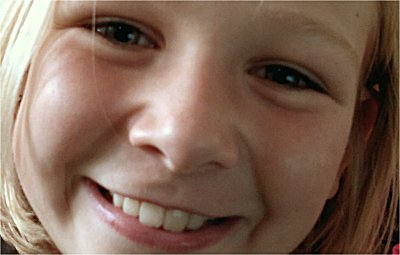
Hallo Wereld
Hallo, kan iemand mij verstaan?
Alle mensen op de wereld,
Luister…
Luister even…
Ook vandaag lees ik
Weer voor uit,
Een van mijn gedichten.
Radio,
En televisie
Luister allemaal, vandaag de
Dag lees ik iets voor, wat ik al keren deed.
Pleun Andriessen
Pleun Andriessen is kinderstadsdichter van Tilburg
kempis.nl poetry magazine
More in: Andriessen, Pleun, Archive A-B
Thank you for reading Fleurs du Mal - magazine for art & literature